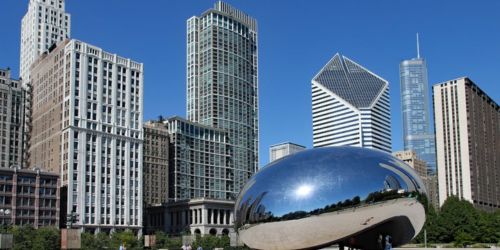Chicago, the dynamic Midwest city, has always caught the imagination of young adults seeking new chances and an urban lifestyle. With its numerous neighborhoods, booming arts scene, and famous architecture, Chicago provides a one-of-a-kind experience that appeals to a wide range of people. However, before deciding to relocate to Chicago, it is critical to analyze the numerous factors that contribute to a city being a suitable place to live for young adults. In this expert guide, we will look at the benefits and drawbacks of living in Chicago, allowing young adults to make an informed decision about whether the Windy City is good for them.
Where Exactly is Chicago?
Chicago is in the American state of Illinois. It is located in the state’s northeastern corner, along the southwestern shore of Lake Michigan. Chicago is the third most populous city in the United States and a major economic and cultural center in the Midwest.
Is Chicago A Good Place To Live For Young Adults?
Have you ever considered the benefits and drawbacks of living in Chicago? Chicago attracts many people eager to improve professionally and personally, thanks to its four seasons, ethnically diverse neighborhoods, and expanding job options. Before relocating to a new city, it is critical to weigh the benefits and drawbacks to feel sure about your decision.
As someone who has lived overseas several times, I know what to look for. So, to help you decide if the Windy City is a good place to live as a young adult, let’s look at the benefits and drawbacks of living in Chicago!
#1. Economic Opportunities and Job Market: A Hub of Possibilities for Career Growth
Chicago has a thriving and diverse economy that attracts a diverse variety of sectors and provides a plethora of career options for young people. The city is a global financial center, with notable companies in finance, technology, healthcare, and other fields. In Chicago, major enterprises, startups, and entrepreneurial initiatives thrive, providing opportunities for job advancement and professional development. The city’s central location also makes it easier to reach national and international markets, creating an ideal setting for young adults looking to further their careers.
#2. Cultural Scene and Entertainment: A Tapestry of Arts, Music, and Festivals
Chicago is well-known for its dynamic cultural scene, which provides a plethora of entertainment opportunities for young adults. The city has a flourishing arts culture, with world-class museums like the Art Institute of Chicago, legendary theaters like the Steppenwolf, and comedy clubs like the Second City. With various live music venues distributed across the city, music fans may enjoy a varied spectrum of genres, from blues and jazz to indie rock and hip-hop. Furthermore, Chicago’s renowned festivals, such as Lollapalooza and the Taste of Chicago, offer exciting experiences and an opportunity to celebrate the city’s rich diversity.
#3. Cost of Living: Weighing the Expenses and Affordability
Living in a busy city like Chicago comes at a cost. In comparison to other parts of the Midwest, the cost of living in the city can be relatively high. Rent and property prices can be high, especially in popular neighborhoods such as Lincoln Park or the Loop. However, it’s worth noting that more affordable options can be found on the city’s outskirts and in neighboring suburbs. Furthermore, expenses such as groceries, transportation, and entertainment can add up, affecting young adults’ overall affordability.
#4. Neighborhoods and Community: Finding Your Niche in the City
Chicago is a city of neighborhoods, each with its unique personality and charm. Young adults can find a community that matches their preferences and interests. There is a neighborhood to suit every lifestyle, whether it’s the vibrant energy of Wicker Park, the artistic allure of Pilsen, or the coziness of Lincoln Square. Each neighborhood provides a mix of housing options, local businesses, parks, and community events, fostering a sense of belonging and creating a close-knit community for young adults to call home.
#5. Safety and Security: A Focus on Personal Well-being
Chicago, like any major city, has areas with higher crime rates and safety concerns. While overall crime rates have decreased in recent years, young adults must research and choose safe neighborhoods. Participating in local community organizations, staying up to date on neighborhood initiatives, and using common sense can all help to alleviate safety concerns. Furthermore, the city’s police force and community initiatives are constantly working to improve safety measures and foster a secure environment for all residents.
#6. Transportation and Connectivity: Getting Around the City
Chicago has a well-developed public transportation system that makes it relatively easy for young adults to get around the city and beyond. The Chicago Transit Authority (CTA) operates a large network of buses and trains that provide easy access to many neighborhoods and suburbs. For daily commuters, the L train system, in particular, provides efficient transportation options. Furthermore, the city’s bike-sharing program and plentiful bike lanes make cycling a popular and environmentally friendly mode of transportation. O’Hare and Midway airports in Chicago provide convenient flight connections for those who need access to regional or international travel.
Best Place to Live in Chicago
Determining a good place to live in Chicago as a young adult depends on individual choices and goals. The city offers a broad selection of communities, each with its unique flavor and attractions. Here are some popular neighborhoods in Chicago that are often regarded as a good place to live:
#1. Lincoln Park
Known for its lovely parks, tree-lined streets, and closeness to Lake Michigan, Lincoln Park offers a mix of residential areas, boutique stores, restaurants, and entertainment opportunities. It’s a dynamic area with a blend of historic charm and modern comforts.
#2. Lakeview
Situated along the lakefront, Lakeview is a bustling neighborhood with a thriving entertainment scene, numerous eating options, and a mix of residential areas. It’s home to Wrigley Field, the historic baseball stadium, and offers convenient access to the lakefront trail and parks.
#3. Bucktown/Wicker Park
These surrounding communities are recognized for their artistic and creative ambiance. They contain stylish boutiques, art galleries, music venues, and a thriving food and bar scene. Bucktown and Wicker Park feature a blend of historic architecture and new developments.
#4. West Loop
Formerly an industrial region, the West Loop has changed into a hip neighborhood with expensive restaurants, boutique stores, and converted loft spaces. It’s a bustling region noted for its vibrant eating scene and accessibility to downtown Chicago making it a good place to live as adults.
#5. Logan Square
Located on the city’s northwest side, Logan Square is noted for its thriving cultural scene, historic boulevards, and varied community. The neighborhood includes a mix of residential areas, trendy bars, and recognized restaurants, and is home to lovely parks.
#6. Streeterville
Situated on the Near North Side, Streeterville is a lively neighborhood that offers spectacular lakefront vistas and convenient access to downtown. It is home to Navy Pier, high-rise apartment towers, luxury hotels, and upmarket shops.
These are just a few examples of the many fantastic places to live as young adults in Chicago. It’s crucial to tour different places and evaluate variables such as accessibility to work, safety, amenities, and personal preferences to identify the greatest fit for an individual’s lifestyle.
What are the disadvantages of living in Chicago?
While Chicago offers various advantages, it’s vital to examine potential disadvantages as well. Here are some characteristics that some persons may consider as drawbacks of living in Chicago:
- Cost of Living: Chicago’s cost of living can be quite high compared to other cities in the Midwest. Housing costs, both rent and property prices, can be costly, especially in popular regions closer to downtown.
- Traffic and Parking: Like any major city, Chicago can endure considerable traffic congestion, particularly during peak hours. Navigating through busy streets and finding parking may be tough and time-consuming, especially in urban locations.
- Weather: Chicago is notorious for its erratic weather patterns. Winters can be difficult, with cold temperatures, strong winds, and snowstorms. Summers can be hot and humid. The city’s status as the “Windy City” can also make the weather feel colder and more intense.
- Crime Rates: While general crime rates in Chicago have been falling in recent years, some neighborhoods still have higher crime rates compared to others. It’s vital to research and choose safe communities and keep aware of personal safety procedures.
- Public School System: Chicago’s public school system has had obstacles in the past, including issues connected to budget and educational quality. While there are good public and private school alternatives available families with children may need to investigate and examine their educational choices carefully.
- Seasonal Allergies: Chicago’s green spaces and proximity to Lake Michigan can contribute to seasonal allergies. Some individuals may have symptoms such as hay fever during specific seasons of the year.
Is Chicago expensive to live in?
Yes, Chicago can be considered an expensive place to live in, especially when compared to other cities in the Midwest region of the United States. Chicago’s cost of living is greater than the national average. It is crucial to remember, however, that the cost of living varies depending on factors such as location, housing choices, lifestyle preferences, and personal spending habits.
Should I live in Chicago or New York?
Your unique preferences, lifestyle, and goals will ultimately determine whether you live in Chicago or New York. Both cities provide unique experiences and opportunities, yet they are distinct. Here are some things to think about before making a decision:
- Cost of Living: New York City has a higher cost of living than Chicago.
- Career Opportunities: Both cities have a plethora of career opportunities in a variety of industries.
- City Size and Life Pace: New York City is far larger and more densely inhabited than Chicago.
- Cultural and Entertainment Scenes: Both cities have vibrant cultural and entertainment scenes, but their offers vary.
- Outdoor Spaces and Urban Amenities: New York City offers a wide range of urban amenities. With beaches, parks, and recreational areas around Lake Michigan, Chicago has a more accessible and expansive lakefront.
Can you live in Chicago without a car?
Yes, it is possible to live in Chicago without owning a car. The city boasts a well-developed public transportation system that can efficiently carry you to most city destinations as well as several suburbs. The Chicago Transit Authority (CTA) manages a large network of buses and trains, including the “L” rail system, which is made up of multiple lines that service different areas of the city.
Does Chicago get snow?
Yes, snow falls in Chicago throughout the winter months. The city has a typical Midwestern climate with frigid winters and hot, humid summers. Snowfall in Chicago typically begins in late November or early December and lasts until March, with December and January seeing the most snowfall.
Is Chicago colder than New York?
Yes, Chicago is colder than New York. Both cities have frigid winters because of their northern positions, but Chicago’s proximity to Lake Michigan and its nickname “Windy City” contribute to colder temperatures and greater winds.
What is the coldest month in Chicago?
January is often the coldest month in Chicago. In the city, January has the lowest average temperature of the year. Temperatures in Chicago might fluctuate from an average high of approximately 31°F (-1°C) to an average low of around 16°F (-9°C) during this month. It’s crucial to note that these temperatures can fluctuate, and extreme cold snaps or winter storms can cause temperatures to plummet even further.
Is Chicago a cold country?
Chicago is a city in the United States, not a country. Due to its northern location and proximity to the Great Lakes, Chicago does encounter chilly weather. The city has four distinct seasons due to its continental climate. Winters in Chicago may be bitterly cold, with temperatures frequently falling below freezing and snowfall on occasion. Summers, on the other hand, can be oppressively hot and humid. While Chicago has cold weather, it is not classified as a “cold country” in the same way as countries in the Arctic or subarctic regions are.
Conclusion
Chicago is an incredibly exciting and dynamic city that provides numerous chances for young folks seeking an urban lifestyle. The Windy City has a lot to offer with its numerous neighborhoods, lively arts scene, powerful career market, and cultural richness. However, it is critical to balance the qualities that make a city a desirable place to live with personal tastes and goals.
The economic opportunities in Chicago, combined with the city’s rich cultural scene and entertainment options, offer a dynamic atmosphere for young professionals. The city’s different neighborhoods offer a sense of community as well as the opportunity to find a living place that meets individual needs. However, it is critical to consider the cost of living, which can be very high, particularly in some affluent areas.
Another issue that must be addressed is safety. While general crime rates have reduced, some places may still have higher crime rates, thus it is critical to research and select safe communities. The Chicago Transit Authority (CTA) and airports provide seamless connectivity and accessibility throughout the city and beyond.
In the end, whether Chicago is a decent place to live for young adults is determined by particular circumstances and priorities. Individuals can make an informed selection that matches their goals and lifestyle preferences by thoroughly researching and visiting the city.
So, is Chicago a good place for young adults to live? The answer lies in the unique needs and goals of each individual. Chicago has the potential to be an exciting and gratifying city to live in, with its bright energy, availability of opportunities, and different cultural experiences.
- WORST NEIGHBORHOODS IN CHICAGO IN 2023
- BEST ROAD TRIPS FROM CHICAGO
- BEST ZOOS IN CHICAGO IN 2023
- MOVING TO NEW YORK: All You Need To Know
- BEST THINGS TO DO IN COLD SPRING NY






